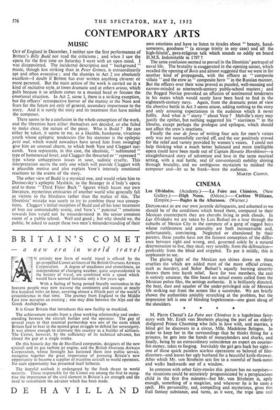CONTEMPORARY ARTS
MUSIC
Our of England in December, I neither saw the first performances of Britten's Billy Budd nor read the criticisms ; and when I saw the opera for the first time on Saturday 1 went with an open mind. I was disappointed. The incidental descriptive and " background" music, though less striking than in Peter Grimes, is extraordinarily apt and often evocative ; and the shanties in Act 2 are absolutely excellent—I doubt if Britten has ever written anything cleverer or more personal. But the main action of the work is carried on in a kind of recitative style, at times dramatic and at others arioso, which palls because it so seldom comes to a musical head or focuses the emotional situation. In Act 2, scene 1, there is a striking exception, but the officers' retrospective horror of the mutiny at the Nore and fears for the future are only of general, secondary importance to the story. And it is surely the story and its treatment that have misled the composer.
There seems to be a confusion in the whole conception of the work, and the librettists have either themselves not decided, or else failed to make clear, the nature of the piece. Who is Budd ? He can either be taken, it seems to me, as a likeable, handsome, vivacious youth whose epileptic tendencies (for his stammer is the epileptic petit ma!, which would nowadays have saved him from swinging) give him an unusual charm, to which both Vere and Claggart suc- cumb. Vere represents, in this case, the idealistic, " sublimated " type of homosexual lover, and Claggart the thwarted or" repressed" type whose unhappiness issues in sour, sadistic cruelty. This interpretation seems the only one which will provide Claggart with a plausible motive and also explain Vere's intensely emotional reactions to the events of the story.
The other view of Budd is a mystical one, and would relate him to Dostoevsky's epileptic Myshkin, to the Stranger in d 'Indy 's opera and to those "Third Floor Back" figures which haunt our own literature, mysterious emissaries of another world who generally fall as victims to the blindness rather than the malice of this. The librettists' mistake was surely to try to combine these two concep- tions. Claggart 's initial reception of Budd and all his later treatment , of him are unmistakably ' erotic, and Vere's " paternal " emotions towards him would not be misunderstood in the senior common room of a public school. Well and good ; but why should we, the public, be asked to accept these two men's misunderstanding of their own emotions and have to listen to tirades about "beauty, hand- someness, goodness" (a strange trinity in any case) and all the high-falutin'„ para-religious talk which sounds so oddly on board H.M.S. Indomitable in 1797?
The same confusion seemed to prevail in the librettists' portrayal of naval life. The brutality is exaggerated in the opening scenes, which recalled the opening of Boris and almost suggested that we were in for another kind of propaganda, with the officers as "composite villain "and the crew as" composite hero "in the Russian manner. But the officers over their wine proved as puzzled, well-meaning and narrow-minded as nineteenth-century public-school masters and the flogged Novice provoked an effusion of sentimental tenderness in his mates which would surely have been hard to find in the eighteenth-century navy. Again, from the dramatic point of view the abortive battle in Act 3 seems otiose, adding nothing to the story and only arousing expectations in the audience which it never fulfils. And what is" starry "about Vere ? Melville's story may justify the epithet, but nothing suggested his " starriness " in the libretto, except perhaps the prologue and epilogue, which should not affect the crew's reactions.
Finally the tour de force of writing four acts for men's voices only was not successfully carried off, and the ear positively craved for the relief and variety provided by women's voices. I could not help thinking what a much better balanced and more intelligible opera eould have been made out of Captain Horatio Hornblower—a straightforward story of adventure and love in the same nautical setting, with a real battle, real (if conventional) nobility shining through brutality, and no ambiguous mysticism to mislead the composer and—let us be frank—bore the audience.
MARTIN COOPER.


































 Previous page
Previous page